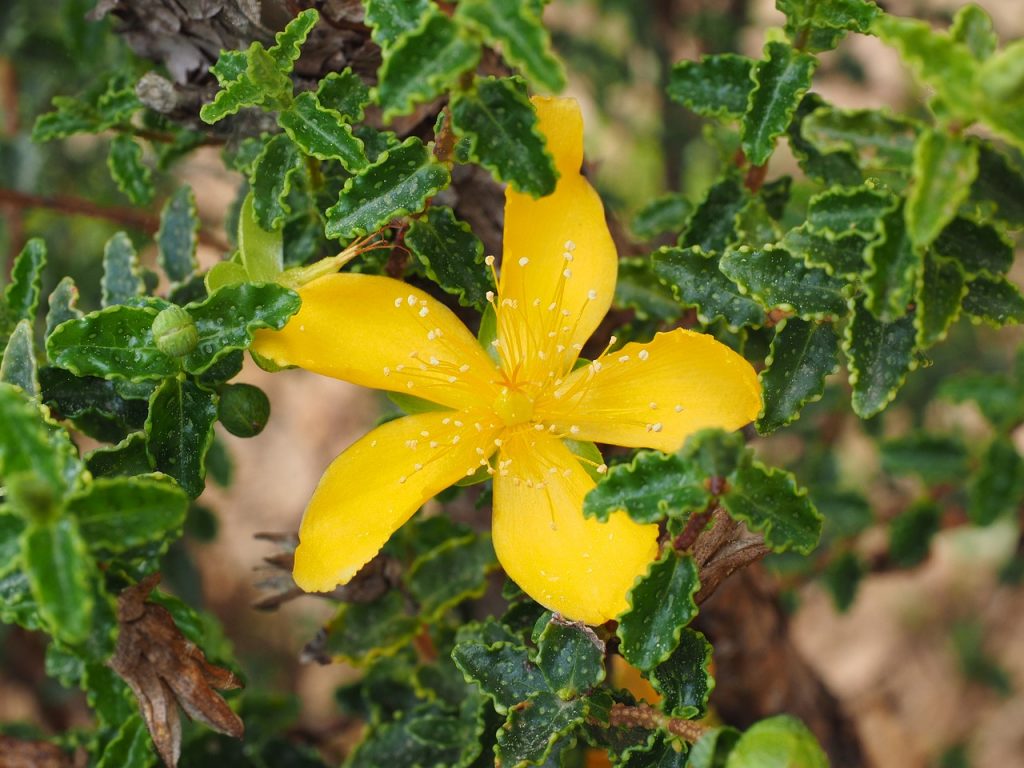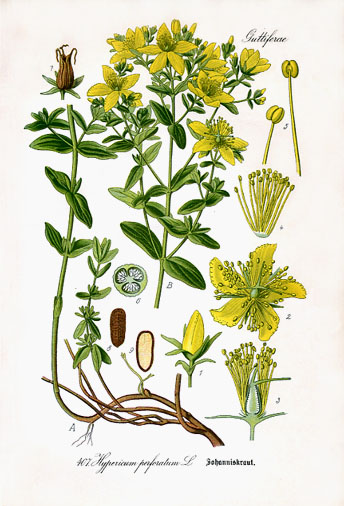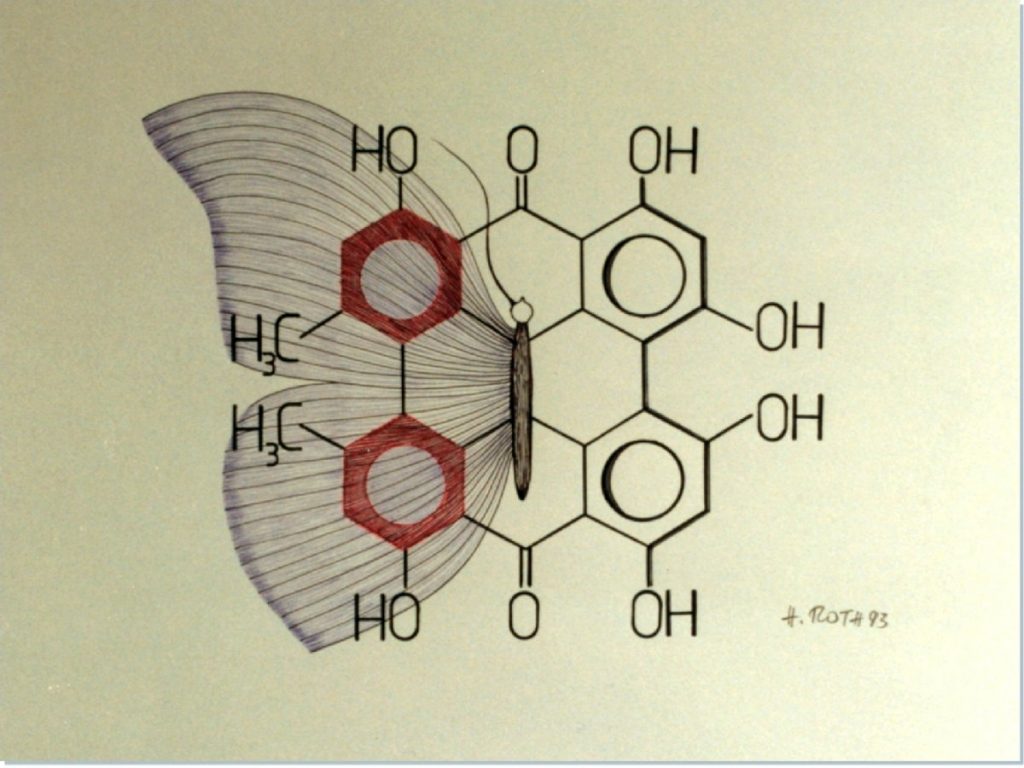
St. John’s Wort is backed by centuries & centuries of positive anecdotal & scientific research, seeping its roots deep into the collective Western human experience for its reliable, well-documented antidepressant benefits & mood-balancing support.
So is a Nootropic Geek review really all that necessary?
You’re damn right it’s necessary: Judgment Day has cometh for our dear Hypericum.
Although, let me be frank: I’ve used & enjoyed this herb for years now, particularly during the short, dark days of winter. I praise it for its antidepressant effects. But does that automatically qualify the plant as a cognitive enhancing nootropic?
Let’s find out.
Page Contents
How St. John’s Wort Is Supposed to Work
To immediately address your first question: Yes, it’s St. John the Baptist.
The wild shrubby plant Hypericum perforatum, or St. John’s Wort, enjoys its bright, yellow blooming stage around June 24, the birth-date of the Christian prophet Saint John, a connection that corroborates with St. John’s Wort’s even older folk status as an “anti-evil” tonic. The Latin name (Hypericum) extends from the Greek eikon, noted by the ancient Greek physician Euryphon as yperikon, which means “over an apparition.”
In ye later olden days, the modern psychological concept of depressive disorder was viewed as a form of possession, a “disease of the soul.” Swiss philosopher, physician, & botanist Paracelsus recommended St. John’s Wort for “healing of the soul” — a prescription for phantasmata, i.e. psychoses & hallucinations.
On that note, frankly, who cares how St. John’s Wort reviews as a nootropic.
This plant SAVES YOUR SOUL.
What am I going to review next? Holy Water???

Chemically speaking, SJW “saves the soul” through an array of psychoactive compounds, including hypericin, pseudohypericin, hyperforin, & adhyperforin, with hypericin believed to be the primary bioactive constituent — although, this remains a contentious point in the SJW community, as some researchers suppose SJW’s mood-supportive benefits to be a cumulative effect of all of its bioactive constituents, proclaiming SJW as “an outstanding example of the total extract being defined as the active constituent of herbal medicines.”
In either case, what then are the resulting bioeffects of SJW on mood & cognition? While the exact mechanisms remain somewhat speculative, a few theories exist, including:
Beta Adrenergic Receptor Inhibition
The first theorized St. John’s Wort biomechanism: SJW inhibits beta adrenergic receptors in the brain, consequently reducing the reuptake of neurotransmitter norepinephrine.
Wow! …What does that mean?
Norepinephrine co-facilitates the stressful “fight-or-flight” effects in the brain, a useful function whilst fighting or flighting but not so much while doing essentially anything else, i.e. studying, reading… quietly existing. Excess norepinephrine activity disrupts normal neuron-to-neuron signalling, limiting the neural pathways underlying basic cognitive functions. By inhibiting the beta adrenergic receptors, reducing norepinephrine reuptake, SJW sustains neural signalling & functionality.
Serotonin Receptor Promotion
Mouse research has demonstrated SJW’s hyperforin leading to an increase in 5-HT2 serotonin receptors in the frontal cortex of the brain. Hyperforin is believed to accomplish this not through directly inhibiting serotonin transporters but by altering the sodium concentrations within the cells, representing “the first substance with a known preclinical antidepressant profile that inhibits serotonin uptake by elevating [Na(+)].”
Dopaminergic Support
One rat study found 300 mg hypericum extract (0.3% hypericin, 4.1% hyperforin) to increase extracellular dopamine levels by 40% in the prefrontal cortex after only 1 hour following administration. A similar reduction in DOPAC and HVA acidic metabolites seemed to suggest that the dopamine increase was a result in SJW extract inhibiting dopamine conversion. Hyperforin extract and, to a greater degree, pure hyperforin strongly inhibit the reuptake of dopamine, resulting in longer dopamine activity in the brain.

St. John’s Wort Benefits
St. John’s Wort serves a primary therapeutic role as a natural antidepressant, particularly in the following conditions:
- Mild to Moderate Depression
- Somatization Disorders
- General Stress & Anxiety
- Seasonal Affective Disorder
Some sources recommend St. John’s Wort for ADHD, although this claim is currently unsubstantiated, with one study finding no significant improvement with SJW supplementation (see below). Rather, SJW provides a seemingly safer alternative to pharmaceutical antidepressants with regards to moderate mood & depressive disorders — perhaps major depressive symptoms, pending a physician’s recommendation.
Any quote-unquote “nootropic” enhancements on cognition (i.e. focus, memory) only come secondary to St. John’s Wort’s mood improvement benefits.
Researchers Have Suggested St. John’s Wort Might:
Safely & effectively improve mild to moderate depression
In this placebo-controlled study, 375 male & female outpatients with mild to moderate depression were given 300 mg hydroalcoholic hypericum perforatum extract 3 times daily for 6 weeks to determine hypericum extract’s mood-balancing effects (as compared to placebo). Results found a significantly greater reduction in depression and significantly more patients in remission with the extract group over placebo, leading to the conclusion that “H. perforatum extract WS 5570 was found to be safe and more effective than placebo for the treatment of mild to moderate depression.”

Outperform fluoxetine in improving major depressive symptoms
This double-blind, randomized trial looked to compare the antidepressant efficacy & safety of St. John’s Wort against both placebo & fluoxetine, an SSRI commonly prescribed for depression, OCD, & panic disorder. In the study, 135 men & women with major depressive disorder were administered SJW extract (900 mg/day), fluoxetine (20 mg/day), or placebo over a 12-week period, with the Hamilton Rating Scale for Depression (HAMD-17) measuring mood changes throughout the trial. The results demonstrated more improvements in the SJW group over the fluoxetine or placebo groups, leading to the conclusion: “St John’s wort was significantly more effective than fluoxetine and showed a trend toward superiority over placebo.”
Alleviate moderate depression as comparable to imipramine
To evaluate the efficacy & safety of SJW extract as compared to placebo & imipramine, a pharmaceutical antidepressant & analgesic, this study administered each of the substances (1050 mg hypericum extract, 100 mg imipramine, placebo) to 3 respective groups sourced from 66 men, 197 women with moderate depression. At the end of the 8-week trial, the researchers found hypericum extract to be clinically safe & effective in reducing mild depressive symptoms — more so than placebo and within a comparable range to imipramine. The conclusion: “At an average dose of 350 mg three times daily hypericum extract was more effective than placebo and at least as effective as 100 mg imipramine daily in the treatment of moderate depression. Treatment with hypericum extract is safe and improves quality of life.”
Prevent relapse after recovery from acute depression
The aim of this double-blind, randomized, placebo-controlled, long-term trial (*gaaasssp!*): Determine the efficacy & safety of SJW extract in preventing relapse after recovery from an episode of recurrent depression. The design: 426 patients were given either 300 mg hypericum extract or placebo three times daily, using the HAMD & Beck Depression Inventory tests to measure improvements in relapse & recovery. By the study’s end, the SJW extract demonstrated significantly greater “over-all improvement” than those randomized to placebo, adding to the conclusion: “[SJW extract] showed a beneficial effect in preventing relapse after recovery from acute depression. Tolerability in continuation and long-term maintenance treatment was on a placebo level.”
Fail to improve attention deficit hyperactivity disorder (ADHD)
In this randomized, placebo-controlled trial, 54 children aged 6-17 with ADHD diagnoses were administered either 300 mg SJW or placebo three times daily for 8 weeks, while other ADHD medications were not allowed. The ADHD Rating Scale-IV & Clinical Global Impression scales for Improvement and Severity measured changes in ADHD behavior, ultimately demonstrating no significant difference between the groups on any measure. In their conclusion, the researchers ended the report with: “use of Hypericum perforatum for the treatment of attention deficit hyperactivity disorder over the course of eight weeks did not improve symptoms.” More on ADHD Nootropics.
The SJW Meta-Analysis
By now, you likely get the gist of SJW. But let me rub it into your brain a little deeper with this meta-analysis review on the herb’s efficacy & safety for major depression. In a compilation review of 29 trials, totaling to ~ 5,500 study subjects, all of whom were administered SJW extract, antidepressants, or placebo, the cumulative data suggests of a generally more positive emotional outcome with SJW than the other tested substances. The conclusion: “The available evidence suggests that the hypericum extracts tested in the included trials a) are superior to placebo in patients with major depression; b) are similarly effective as standard antidepressants; c) and have fewer side effects than standard antidepressants.”
How to Take St. John’s Wort
- Standard SJW dosage recommendation is 900 mg daily, split into 3 servings.
- SJW extract std. to 0.3 – 5% hypericin dosage recommendation is 300 mg.
My Experience with St. John’s Wort
As a self-diagnosed Seasonal Affective Disorder sufferer (it’s actually not that bad, nor am I qualified for legitimate self-diagnosis), I occasionally dabble in the Hypericum during winter-time to introduce a little saintly sunlight into my frosted, sublunary existence.

My preferred form of SJW: Plain powder stirred into tea.
A scoop of St. John’s Wort powder, consumed intermittently, usually 3 times daily if I’m particularly down in the dumps, which, again, tends to be the case during winter-time.
My experience: Inconsistent bouts of feeling good, occasionally “high.”
Not “high” in any druggy sense of the word but a noticeable mood-lift that was initially jarring. Although, occasionally I felt (or noticed) nothing, leading me to think my self-diagnosis was off: That I’m not truly depressed by any clinical definition. That the mood-lifts were circumstantially based on temporary states of general dysphoria.
Even so, I qualify the plain powder SJW experience as positive, reliably peaking for me around the January-February calendar mark.
Is St. John’s Wort a Good Nootropic?
If the bummer blues persistently drag down your focus & mental clarity, then:
Yes — St. John’s Wort may help your cognition.
Although, biomechanically speaking, St. John’s Wort isn’t a true cognitive booster nootropic, at least not directly. With that in mind, I don’t necessarily qualify it as a bona fide nootropic, let alone a good nootropic.
Having said that, St. John’s Wort may be something even more important, given its potential as a safer, non-pharmaceutical antidepressant that’s LEGAL. (Amazing how the truly therapeutic plants are often the most inaccessible…)
My recommendation for new SJW users: Try 300 mg SJW extract std. to < 0.5% hypericin, 3 times daily for a total of 900 mg daily. If you’re a prude like me, start with the powder then amp it up as needed.
Overall St. John’s Nootropic Power Rating
[yasr_multiset setid=0]

Attempting to get more information about where to purchase SJW powder. Would you have any recommendations as to any particular company? I have been trying to find companies that have at least some kind of third-party or any kind of verification to suggest that their product is 100% or at the very least properly labeled. If you could be of any help with this, it would be truly appreciated.
Thank you for your time.